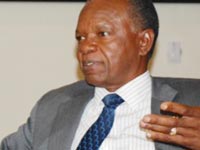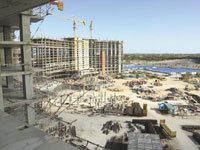
A case involving nearly $700,000 in overpayments to contractors as part of a national landfill development project has been turned over to the police for criminal investigation.
Earl Deveaux, the minister of the environment, said the complexity of the matter and strong criminal evidence warrants the involvement of the Royal Bahamas Police Force (RBPF).
In the end, several contractors could be charged with fraud and theft by way of employment. “The matter is serious because the expenditure of public funds and accounting for public funds is a sacred trust,” Deveaux said. “These (contractors) are given tax dollars. “In the case of the contracts, it is clear that work wasn’t done. or was not done satisfactorily. Public funds were used to pay them and it was done in a manner that was inconsistent with how public funds should be used.”
The landfill project, with works dating back to 2006, sought to create landfill space in several of the Family Islands. The government secured a $23.3 million loan from the Inter-American Development Bank (IDB) to carry out the development of 18 landfills in 10 islands.
A further $10 million was kicked in by the government, bringing the total budget of the initiative to $33.5 million. According to recent inspections by an engineering firm on Long Island, Eleuthera and Andros, contractors were grossly overpaid on several six-figure contracts.
“The contractors for Millerton, Long Island were overpaid by $146,640.00, South Eleuthera by $87,564.00, Central Eleuthera by $65,624.20, Love Hill, Central Andros by $190,301.92, and South Andros, Mangrove Cay by $178,263.50,” Deveaux said in the House of Assembly yesterday.
Shepherd U Management, another engineering firm, visited and inspected other landfills on Cat Island, Andros, Inagua and Abaco, and reported similar results.
“The contractors for North Cat Island were overpaid by $291,572.30, Kemp’s Bay, South Andros by $188,578.50, Inagua by $176,404.93 and Deadwood by $60,542.00,” Deveaux outlined.
Deveaux revealed that the estimated overpayments totaled $668,393.62, with those contractors working in landfills in South and Central Andros being the biggest offenders, followed by those working on Long Island.
The astonishing figures were initially revealed in the Public Accounts Committee’s (PAC) interim report towards the end of last month.
Deveaux noted that it was always designed to be a multi-year project by its very nature. However, during a visit by the IDB team between 2002-2003, Deveaux said it was discovered that the project was two years behind schedule.
In fact, only 17 percent of the work was completed at that point.
President of the Bahamian Contractors Association (BCA) Stephen Wrinkle pointed out to Guardian Business how the lack of transparency in the tendering process is a huge issue that the government needs to address immediately.
“That’s one of the main problems we have in the country, the tendering process is not transparent,” he explained. “Normally in government contracts there is an independent committee that’s charged with the oversight of tenders, and it ensures that the bidding is fair and competitive.”
Deveaux defended the government’s tendering process in awarding contracts.
“The way the financial audit and administration act works, or the government tendering policy works, is that anything up to $50,000, once that is within a ministry or a department’s budget, the minister can authorize but he or she is required by the authorization to ensure that there are at least three quotes. If there are not, usually the Ministry of Finance would deny payment,” Deveaux noted.
In getting the quotes, Deveaux said a department official is required to outline the specifications that candidates must meet before it is approved.
If the contract exceeds $50,000, it requires public consultation which includes the tenders board. This board consists of several sitting permanent secretaries including the financial secretary.
“Now the contract could be selected or it could be made public. If it is selected, any ministry or agency could identify a group of competent persons to do the work, make up a list, and invite those people to bid. They must be provided with the specifications of the bid and everybody should have the same terms,” Deveaux said.
Source: The Nassau Guardian


